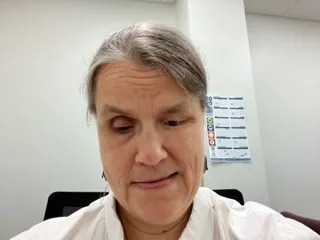What is Disability Pride?
ICI Researcher Jen Bose reflects on her experiences in this guest blog post.
Jen Bose smiling in her office.
Over the past few days, I spent some time learning about disability pride. I know that living with some type of disability is a common experience, and I know that each person makes up their own mind about what having a disability means.
When I first saw the word “disability” written next to the word “pride”, it was like clashing colors; it had a false, hollow ring. It didn’t work and even made me cringe.
On the face of it, a disability does not seem to fit the criteria for something to be proud of. A disability isn’t something anyone earns or accomplishes. A disability isn’t something people seek out and are excited to get. There has been a lot of stigma around disability because it is so often the result of some unexpected negative occurrence, and we humans are naturally afraid of those. It takes some real adjustment and adaptation, by the person with the disability and/or those close to them, before the disability can be seen as just a difference or a characteristic.
As I engage with the broader community — where I want to be — through my various contexts, including professional, mom, neighbor, and friend, I work around my disability, blindness. I have the occasional day when the disability itself feels like a real weak spot, an Achilles’ heel or a source of Kryptonite. The days I like best are when it’s just a quality or characteristic — something to treat with curiosity rather than frustration; something to ask questions about. For me, those questions include: What can I do to appreciate my daughter’s drawing? How do I interact with my kids’ very visual videogame? What do I need to do so that my kids can have the same opportunities their friends have? What can I do to maintain our little garden out front? How can I be a support to my elderly parents without being able to drive? How can I be as involved as possible at work? How do I engage other people without relying much on eye contact?
I highly recommend treating most challenges with curiosity, and maybe the presumption that you can find a way to accomplish them. As a student, I once had a professor who taught me this lesson in 1988, before the passage of the Americans with Disabilities Act. I was about to start my first semester of college when I became interested in taking her introductory astronomy course. She called me to ask if I thought I would really get anything out of such a visual class. I suggested that I attend the first session to try it out and if either of us thought it seemed too difficult, I would leave with no hard feelings. The professor, a curious scientist herself, agreed to that. After the first session, we both knew I was interested and that things had gone really well. From then on, she was an enthusiastic supporter of my participation and success in the class and offered her support if I pursued astronomy as a major.
One of the most interesting things that has resulted from having a disability has been all the people I have met, in all their diverse contexts, who navigate the world with their own disabilities or close to someone with a disability. They show a great deal of creativity and resourcefulness in navigating the world. If their resumes could highlight the way they manage their daily lives as much as what their work experiences have been, employers would hire them in droves!
The biggest source of pride I now see related to disability is the way we just get on with our lives and do what we want to do.
I’ve even been told that my disability isn’t what holds me back from living the life I want. And in moments when I doubt that, I realize that doing nothing keeps us further from the lives we want, while advocating for an accessible world draws us closer.
A man I know who is blind and loves basketball was attending one of his favorite team’s most recent games. He had a small radio and headphones with him to listen to the description of the game as he sat there, surrounded by other fans. A man he didn’t know, watching the game next to him, turned to him and asked: “Hey, why do you come to the game when you could just sit at home and listen to it on your phone or your radio?” In a friendly way, he responded: “Why do you make the effort to come to the game when you could stay at home and watch it on your wide-screen TV?” To me, it’s an attitude like that — an approach to life that says: “I belong here with everyone else.”, that is the true source of disability pride.
